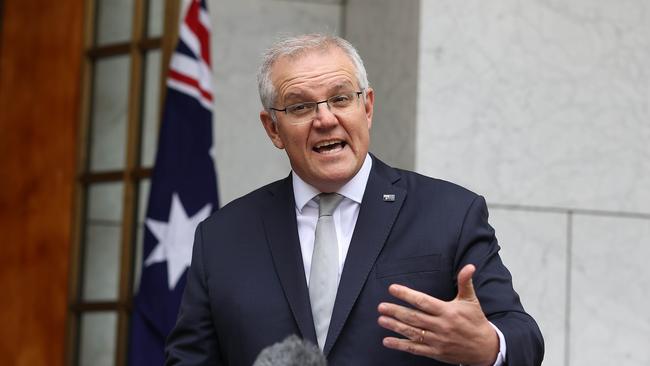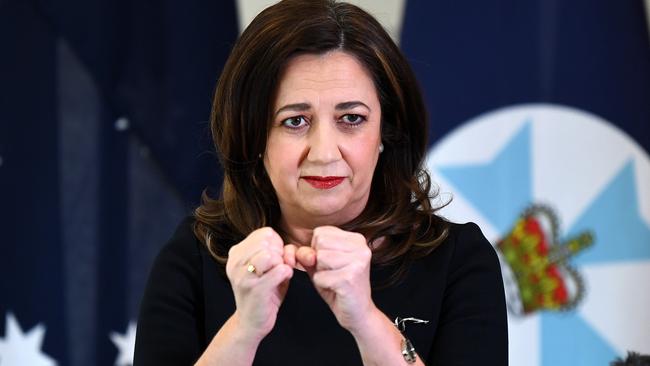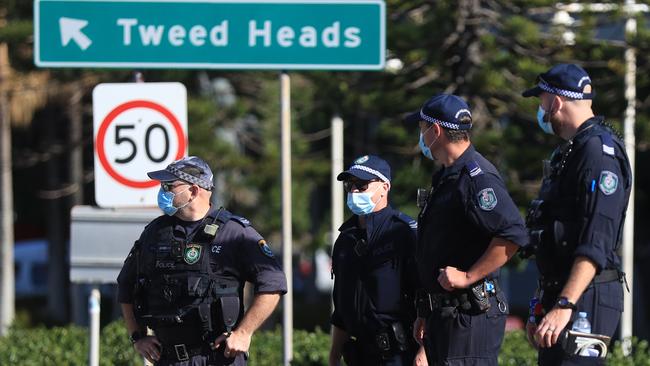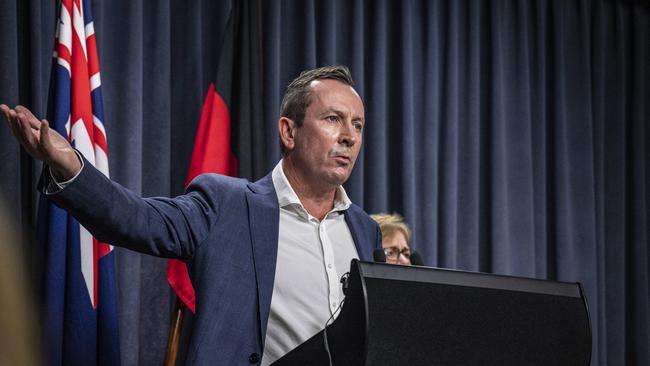Queensland Premier Palaszczuk hasn’t ruled out High Court stoush with PM over NSW border closure
The Queensland Premier has made a bold declaration as the border stoush between Scott Morrison and state leaders intensifies.
Annastacia Palaszczuk hasn’t ruled out fighting the Morrison government in the High Court to defend Queensland’s right to close its borders.
The strong stance comes after emboldened state leaders grew increasingly defiant against the Prime Minister as debate rages about domestic border policy, with Australia edging towards its desired vaccination coverage threshold.
Scott Morrison wants the borders open to return life, and the economy, to normal but premiers — specifically from Queensland and Western Australia — have stood firm.
The political stoush is well into its second year, but constitutional scholars say the messy conflict will be heightened when vaccine rates rise and it will be the High Court, not Mr Morrison, who would have the final say.
When asked if Ms Palaszczuk would be willing to defend her position in the highest court in Australia, a spokesman from the Premier’s office told NCA NewsWire: “The Queensland government makes no apologies for consistently following the health advice to keep Queenslanders safe”.
“Clive Palmer had the support of the Commonwealth when he challenged the Western Australian government and lost,” they said.

Data released by the Doherty Institute last week says border closures and lockdowns will no longer be needed once the population reaches 80 per cent vaccination coverage.
The Prime Minister is eager to reach this milestone and slowly repair shattered consumer confidence caused by the lingering threat of snap lockdowns, declaring “we can’t stay in the cave forever”.
Gladys Berejiklian agrees, desperate for her state’s soaring crisis to be saved by vaccine protection, but Queensland and WA both reserved the right to lock down residents even when jab coverage reaches 80 per cent.
Academics say the Prime Minister could, under the constitution through powers over the responsibility to quarantine Australians and the Biosecurity Act, override state laws and demand premiers and first ministers open borders.
But the High Court accepted the position of state leaders in the case between Palmer and WA, authorising the McGowan government to close borders for the purpose of protecting public health.
Professor Susan Harris Rimmer, Policy Innovation Hub director at Griffith University, said the “Commonwealth can’t, the High Court can” override state leaders.
“Under the Constitution there’s meant to be freedom of movement between the states for the purposes of trade but when Clive Palmer sued WA, the High Court considered border closures then and they said, essentially, that as long as it was proportionate to the health threat or a reasonable response, then the states could shut their borders under that section of the constitution,” she said.

Despite overwhelming public support, the professor said there was a “lot of debate among constitutional scholars” at the time about the extraordinary decision.
“Because that was right at the beginning of the pandemic, I think the High Court was willing to give a little bit of latitude,” Prof Harris Rimmer told NCA NewsWire.
“But now you might be able to say, ‘do they have to have hard closures if there’s only a few cases in one particular place or one particular part of the state?’
“So is it reasonable to close the borders to the whole of Queensland if there’s one case in Cairns? Those are the issues of facts that the High Court would have to think about.
“But if you think about it the other way, the Commonwealth also has the same problem because it is also meant to allow Australians to come and go and it doesn’t because it has decided, under the Biosecurity Act, to take a very hard line to shut the borders externally.”
Legal academic Anne Twomey cited similar powers at the disposal of the Commonwealth, explaining federal parliament has the power to “override” state laws with its own legislation on quarantine.
“Alternatively, it could rely on its external affairs power to legislate to give effect to a right of ‘freedom of movement’ as a means of implementing Australia’s obligations in human rights treaties,” she said.
“However, this might be difficult to do while simultaneously restricting the freedom of movement of Australians to enter and leave Australia.”

Spiking Delta outbreaks and the availability of vaccines have empowered state leaders to defend their borders in previously unseen ways - which constitutional scholars say could also spark a court battle.
Recently, WA announced it would restrict arrivals from states and territories recording 50 cases or more a day to only allow entry to those who have received at least one vaccination and who have returned a negative Covid-19 test in the 72 hours before travel.
The extraordinary measure will apply even to its own residents returning to the state.
“That is also extremely new and I think that would probably be challenged as well,” Prof Harris Rimmer said.
“We’re in the land of novelty here and it will be for the High Court to decide most of these things.”
If the stoush were to progress to the High Court, agreements and discussions from national cabinet about forecasting a vaccination threshold to resume life to normal could be used as an argument.
“All of that will be considered as evidence of a proportionate and reasonable response,” Prof Harris Rimmer said.
“The problem will be is that it is all quite speculative,” she said, considering the advice from the Doherty Institute was based on modelling.
“What we don’t have is something that definitely says 70 per cent vaccination rate is the most reasonable way to protect the population. We don’t actually know that as a fact.”

A spokesman for the WA Premier’s office refused to comment on the likelihood of a High Court challenge but said the national agreement was for states to be afforded the right to lock down and close borders even if the vaccine threshold is reached.
“We're just saying,” Mr McGowan told reporters earlier in the week. “If we get to those points in three or four months time, we retain the right to put in place measures that are agreed.
“But I just remind you all, this is a massive distraction, a massive smoke screen away from what is happening in NSW right now.
“We shouldn't be having this huge national argument about what happens in December, we should be worried about what’s happening in NSW in August because that is the risk both to the people of NSW and to the people of the rest of the country.”
The Prime Minister’s Office did not respond to multiple requests for comment.




To join the conversation, please log in. Don't have an account? Register
Join the conversation, you are commenting as Logout